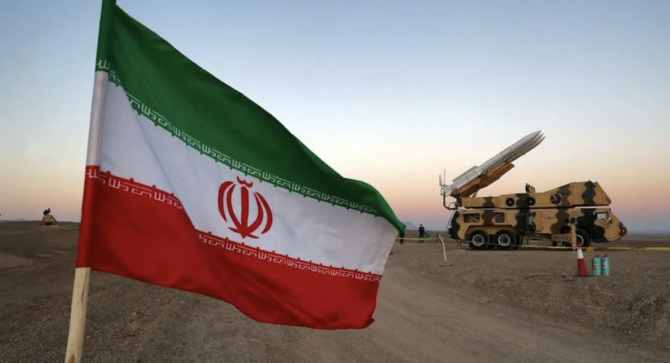
- ARAB NEWS
- 29 Apr 2024

The removal of Israel and the burning of its cities has long been one of the publicly repeated threats issued by Iranian leaders at all levels. These threats turned into promises to the Iranian people and the Arab people, who believe that Israel must be contained. Regional actors, particularly Saudi Arabia and the other states of the Gulf Cooperation Council, have warned for months about the dangers of escalating volatility in the region. Yet, once again, nobody is listening. Since the beginning of the Islamic revolution in 1979, Iran’s policy has been based on instituting itself as the exceptional power confronting Israel and the force that stands in the way of Israel’s aggressive expansionist policy.
From the outset, the Iranian leadership has tried to position itself as the guardian of the rights of the Palestinian people and the leading player in the Palestinian struggle against Israel.
This policy turned into the hijacking of the Palestinian cause and employing the plight of the Palestinians in an utterly obscure manner to support Iran’s expansionist and interventionist regional policy and national interests. Under the guise of defending the Palestinian cause, Iran has been able to build its two regional empires, stretching from the Arabian Sea to the shores of the Mediterranean.
The seeds of promises that Iran planted in the imagination of the helpless Palestinian and Arab citizens were nurtured by the claim that Iran is the only power with the will and ability to destroy Israel. Any Arab citizen who has witnessed the Palestinian tragedy realizes the historical injustice that was suffered by Palestinian citizens and the continuation of this injustice for more than 70 years. The Arab community wishes for nothing more than to see a force secure the rights of the oppressed Palestinians. Still, it does not want to see the humanitarian cause supported on misinformation in exchange for the self-indulgence of a force that cannot fulfill its promises and that is capitalizing on the emotions of the oppressed.
Iran’s missile attack on Israel marks the “promised day” that has been eagerly awaited by Palestinian and Arab citizens, as well as perhaps every other human being who has felt the historical injustice committed against the Palestinian people. Although the core of the current crisis between Iran and Israel was a reprisal for Israel’s attack on the Iranian consulate in Damascus that killed several Revolutionary Guard leaders, Tehran used this as an issue (that was not directly related to the Israeli aggression in Gaza) that falls within the framework of the Iranian-Israeli struggle for regional influence and hegemony. Iran’s decision to punish Israel was a welcome act in some quarters.
This attack did not succeed in ‘removing Israel from the map,’ as the Iranian leaders have repeatedly promised.
Dr. Abdulaziz Sager
The promised Iranian attacks on Israel are a fait accompli and the task now at hand is to assess the degree of its success/failure. What we know is that this attack did not succeed in “removing Israel from the map,” as the Iranian leaders have repeatedly promised, and it did not “burn Israel’s cities.” Nor did the attack avenge the more than 33,000 Palestinian citizens who have lost their lives in the midst of the current Israeli aggression on the Gaza Strip, or the hundreds of thousands of lives that have been lost since the beginning of the Israeli occupation. Neither did it destroy Israel’s infrastructure or impede its military capabilities.
The key to the Palestinian tragedy remains with Washington and the pressure it will exert on the Netanyahu government. To be sure, Benjamin Netanyahu wants this escalation for three key reasons. Firstly, it keeps Gaza out of the news and lessens the pressure on Israel to make any concessions, no matter how small, to the Palestinians. Secondly, a confrontation with Iran rallies Western support behind Israel. And thirdly, it keeps the Netanyahu government in power and deflects from the Israeli movement calling for early elections. As such, Netanyahu will continue to ignore US pressure as long as possible.
Iran does not want further escalation, but it will also not sit idly by in the case of further Israeli aggression and/or retaliation. The fact that Iran announced a response to the attack on its consulate in Damascus and then waited nearly two weeks to implement it indicates the intention of a more symbolic act, rather than an act invoking a broadened escalation of violence.
The West needs to keep its eye on the ball as far as Gaza is concerned. The root causes of the conflict must continue to be addressed and should not be forgotten. Europe must avoid falling into Netanyahu’s trap of portraying this as a battle of good vs. evil.
The inevitable outcome of the Iranian missile attack on Israel is the breakdown of the myth and the end of the illusion that the Iranian leaders imparted on the imaginations of the Arab world: that supporting Iran, its revolution and its leaders is the only way to effectively deal with Israeli arrogance and aggression.